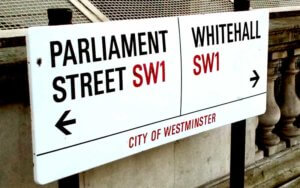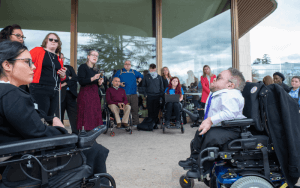Inclusive education activists were at the high court in London this week to support a disabled pupil in her legal fight to secure full participation in all aspects of life at her mainstream school.
The Alliance for Inclusive Education (ALLFIE) is one of the organisations supporting Anna’s* mother in her claim that their local authority is failing to ensure that her daughter has the support she needs at school.
She approached ALLFIE last summer for support with their court case.
Anna’s school had been facing problems recruiting qualified teaching assistants with the necessary experience in using Braille.
As a result, Anna, who has a significant visual impairment, had not been able to take part in the curriculum on a par with her non-disabled classmates.
Their local authority had given individual schools responsibility for recruiting and employing teaching assistants for their disabled pupils, but this meant there was no central pool of assistants available for disabled pupils.
Anna’s lawyers were set to argue this week that this meant that the local authority, which cannot be named, has been breaching the Equality Act’s public sector equality duty, the European Convention on Human Rights (ECHR) and the UN Convention on the Rights of Persons with Disabilities (UNCRPD).
As the law stands, there is a general presumption that disabled pupils will be educated in a mainstream school, but there is no guidance on how local authorities should arrange special educational needs and disability (SEND) provision for disabled pupils who have education, health and care plans.
The case was mentioned in the House of Lords on Tuesday by the disabled Labour peer and former education secretary Lord [David] Blunkett, who said that disabled young people like Anna were “desperately struggling” because of a lack of support.
The junior education minister Lord Agnew told him that spending plans beyond 2019-20 would be set at the next spending review, and that the government was “committed to securing the right deal for education, including for those children and young people with special educational needs”.
ALLFIE says there is no requirement for local authorities to arrange their SEND provision in a way that maximises the participation of disabled pupils in all aspects of school life, or to maximise parental choice in finding a mainstream school for their disabled child.
It wants the high court to provide guidance on how local authorities can comply with their duties free from disability-related discrimination, under the Equality Act, the UNCRPD and the ECHR.
The UN’s committee on the rights of persons with disabilities was highly critical of the UK government’s record on inclusive education when it published its “concluding observations” on the progress the UK had made in implementing the UNCRPD in August 2017.
The committee was highly critical of the UK government’s approach, and the “persistence of a dual education system” that segregates increasing numbers of disabled children in special schools.
It called instead for a “coherent strategy” on “increasing and improving inclusive education”, which would include raising awareness of – and support for – inclusive education among parents of disabled children.
Simone Aspis (pictured with a megaphone outside the high court), ALLFIE’s policy and campaigns coordinator, told Disability News Service outside the Royal Courts of Justice yesterday (Wednesday): “There are some local authorities and schools that do a very good job, and some will not.
“What we are looking for here is guidance that makes it quite clear that whatever model is used by the local authority, it has to [maximise] disabled children’s rights to access the whole curriculum, and extra-curricular activities as well.”
She said earlier: “The problem about the presumption of mainstream education is that even though disabled pupils have the right to be included in mainstream school, there is nothing in law that guides local authorities and schools on arranging SEND provision that enables them to participate in mainstream education on a par with their non-disabled peers.
“The legal challenge comes after the UNCRPD committee found that the UK has systematically violated disabled pupils’ human right to mainstream education, as set out in UNCRPD article 24.
“The committee recognises the fundamental role of SEND provision in promoting disabled pupils’ human right to mainstream education without discrimination.”
She added: “This is a very important case because for too many disabled pupils, failure in mainstream schools arises when local authorities do not arrange SEND provision in a timely manner and in a way that guarantees high quality support to enable disabled pupils to follow the entire school curriculum at all times, ie without any gaps.
“This leaves disabled pupils being treated in a discriminatory way, as they are denied full participation in the school curriculum and all aspects of school life because they are disabled and require assistance.
“We therefore want the court to issue guidance and rule that leaving disabled pupils without appropriate assistance to engage in mainstream education is disability discrimination and a breach of disabled pupils’ human rights.”
*Not her real name
A note from the editor:
Please consider making a voluntary financial contribution to support the work of DNS and allow it to continue producing independent, carefully-researched news stories that focus on the lives and rights of disabled people and their user-led organisations.
Please do not contribute if you cannot afford to do so, and please note that DNS is not a charity. It is run and owned by disabled journalist John Pring and has been from its launch in April 2009.
Thank you for anything you can do to support the work of DNS…

 Government is misrepresenting workplace disability inequality, MPs are told
Government is misrepresenting workplace disability inequality, MPs are told Government’s response to UN committee ‘was insult to disabled people’
Government’s response to UN committee ‘was insult to disabled people’ UN committee asks government: ‘Why are you demonising disabled people?’
UN committee asks government: ‘Why are you demonising disabled people?’